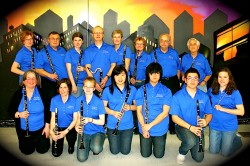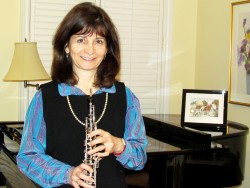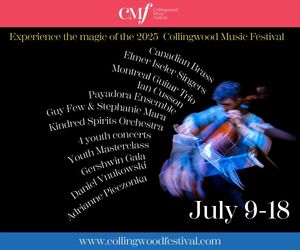In past columns you’ve read about many of the “big guns” come to town — major, professional orchestras, world-renowned soloists and quartets — and you’ve read about an array of gifted artists presented to us by local groups and organizations who don’t have the big bucks but have great taste and know a talented “up and comer” when they see one.
This month, I want to focus on two other categories: first, ensembles which don’t easily fall under neat labels such as “quartet,” “quintet” or “chamber orchestra,” because they are constantly morphing in size, depending on what’s on the program; and second, the community orchestras which provide the backbone of the musical life of their communities. Both attract dedicated bunches of musicians who play for the love of it in a variety of settings including seniors’ residences, hospitals, churches, intimate venues and large concert halls. Here’s what some of them are up to this month.
“Extra cello” with magic on the side, please: The ensemble called Alchemy offers the following irresistible blurb on its website: “Alchemy was a medieval chemical science and speculative philosophy which aimed to transform base metals into gold, and to discover a universal cure for disease and a means of indefinitely prolonging life. Notwithstanding its failure to succeed, some of its lofty aims have been inherited by a group of Toronto musicians who feels that if music cannot prolong life and cure disease — though who can tell — it is certainly known to transform an ordinary hour into something magical.”
Alchemy began “making magic” in 2003 and has since performed chamber music from the 17th to 21st centuries with about 50 musicians, selected from a pool of accomplished friends and colleagues. Meri Gec, pianist, founding “alchemist” and the group’s program coordinator, explains: “The mix continually changes, depending on which instruments are needed for a program idea and which musicians are available. Program and repertoire ideas come from anywhere — the musicians, the internet, radio, summer music camp, live concerts.”
Gec’s role is to organize the one-hour programs using those ideas. And while, more often than not, she’s the one “initiating the ideas and recruiting the right musicians” (most with busy lives and day jobs), she adds that “the musicians participate actively with researching ideas, finding extra musicians when needed, introducing pieces at concerts, suggesting venues, and so on.” As she says, “Alchemy has become an engaged and collaborative ensemble.” For Gec, Alchemy represents “all that is great about music, friendship, and community service.”
It’s a winning combination that has seen the ensemble perform for almost ten years and at over 20 venues — all of which have been predominantly retirement residences and hospitals, in keeping with the ensemble’s original — and unwavering — philosophy. Fittingly, Alchemy will perform at Baycrest Centre on May 23 at 7pm. On the program is Prokofiev’s Overture on Hebrew Themes, String Quartet Op.44 No.1 by Mendelssohn and Mozart’s Clarinet Quintet. Gec (on piano), will be joined by Kaye Royer on clarinet, violinists Catherine Sulem and John Bailey, violist Dorothy Pellerin and Susan Naccache on cello. Heal on, musical alchemists!
 Did someone order an extra clarinet? Make that 18. That’s the number of members currently playing in the Wychwood Clarinet Choir. This lively group is now in its third season and they’re going strong, under the leadership of Michele Jacot, WCC’s artistic director and conductor. Founding member Roy Greaves, who plays bass clarinet with the group (as well as the “usual soprano in b-flat” that everyone in the ensemble plays), shared a few words with me, by e-mail, about the WCC, starting with its inception in 2009:
Did someone order an extra clarinet? Make that 18. That’s the number of members currently playing in the Wychwood Clarinet Choir. This lively group is now in its third season and they’re going strong, under the leadership of Michele Jacot, WCC’s artistic director and conductor. Founding member Roy Greaves, who plays bass clarinet with the group (as well as the “usual soprano in b-flat” that everyone in the ensemble plays), shared a few words with me, by e-mail, about the WCC, starting with its inception in 2009:
“Some adult clarinet students of Michele Jacot were looking for an alternative to playing in a community band at the same time as Michele was considering adding conducting to her teaching and performing schedule. I was about to retire from teaching music at Oakwood Collegiate (Michele is a former student of mine) and was also looking for a different musical challenge. (The teacher becomes the student; the student the teacher.) Thus began the start of the Wychwood Clarinet Choir.”
By fall of that year, a rehearsal space was found, as were several like-minded clarinetists, and in its first season the WCC gave two major concerts along with smaller performances, including one at the (then) new Wychwood Barns. They’ve since added school performances to the mix, along with opportunities for high school and university students to perform with them, in varying capacities, including that of conductor. While Greaves assists with artistic choices and occasionally conducts, and several members of the group arrange and compose for the choir, he credits Jacot with having the “vision that really makes the group work.” Jacot gets the last word (which I lifted from the WCC’s website): “The goal of the WCC is to both learn together as well as to play the best music possible to reflect the unique sound of our ensemble and it’s my job to ensure that we have fun doing it.”
Well, actually, I get the last word: the WCC’s “Spring Concert 2012” is on May 27, 3:30pm, at St. Michael and All Angels Church. On the wonderfully eclectic program will be works by Julius Fucik, Clare Grundman, Glenn Miller, Mozart and Mancini.
Putting the “commune” in community orchestra: There are well over a dozen concerts being performed by community orchestras (COs) this month. So, rather than scant words about each, I thought I’d ask one dedicated CO player to give you an idea of the many rewards of participating in this often unsung sector of the musical scene. (You will also find a number of CO concerts in the Quick Picks list at the end of this column.)
Adam Weinmann, a busy oboe player, accompanist, cabaret performer and teacher (and our Canary Pages editor) suggested I contact Laura Rosenfield, principal oboe with the NYCO Symphony Orchestra, someone he met when he sat in with NYCO a few times, about two years ago. Good call, Adam.
“Belonging to a community orchestra means playing the world’s most beautiful music with like-minded people who share a love of classical music,” Rosenfield wrote. “Community orchestras allow amateurs of all ages and from all walks of life to experience the joy of making music, as well as the opportunity to grow and improve as musicians. They also offer high school students and university music majors invaluable real-world experience with conductors, ensemble playing, and classical repertoire. While I frequently attend concerts by professional orchestras, I love the unique and thrilling challenge of playing the same repertoire in ‘my’ community orchestra.
“Perhaps the greatest reward of performing is bringing music to audiences that might not otherwise be able to hear live music, via outreach concerts in seniors’ homes and hospitals. School concerts, which help children to appreciate classical music and learn about the instruments of the orchestra, are heartwarming experiences, as well. I think that my own children learned early to appreciate classical music by hearing my daily practice, as well as recordings of pieces I was working on. Also, they were curious to attend mom’s concerts!
“Amateur orchestras foster a feeling of community that is truly enriching and transformative. I have learned about the volunteer and non-profit sector, have benefited from taking on various volunteer administrative tasks in community music over the years, and have made lasting friends. I suspect that most of my fellow musicians would agree that the stresses of everyday life melt away when the baton drops and the orchestra begins to play … ”
 The NYCO Symphony Orchestra, by the way, began as a reading orchestra under the auspices of the North York Symphony in 1975 and evolved into an independent, community-based orchestra around 1988. Rather than hold formal auditions, it invites new players to sit in for a couple of rehearsals to test the “compatibility factor.” Then, if you are offered a permanent position you are expected to pay a membership fee. (A wonderful twist to the typical professional musician’s fate of often not getting paid enough for their efforts.) In addition, NYCO members are obliged to purchase a subscription. Clearly, both these fees are critical in allowing this CO to provide its exceptional, community-enhancing, music-making opportunities, and you will find variations on the same theme among many other community orchestras.
The NYCO Symphony Orchestra, by the way, began as a reading orchestra under the auspices of the North York Symphony in 1975 and evolved into an independent, community-based orchestra around 1988. Rather than hold formal auditions, it invites new players to sit in for a couple of rehearsals to test the “compatibility factor.” Then, if you are offered a permanent position you are expected to pay a membership fee. (A wonderful twist to the typical professional musician’s fate of often not getting paid enough for their efforts.) In addition, NYCO members are obliged to purchase a subscription. Clearly, both these fees are critical in allowing this CO to provide its exceptional, community-enhancing, music-making opportunities, and you will find variations on the same theme among many other community orchestras.
You will find Rosenfield in her first oboist’s chair when NYCO performs Smetana’s The Moldau, Tchaikovsky’s Rococo Variations (with principal cellist, Sybil Herceg-Shanahan) and Dvořák’s Symphony No.8, under the baton of its music director and conductor, David Bowser, June 2, 8pm, at Centre for the Arts, St. Michael’s College School. There’s a pre-concert chat at 7:30pm.
Community Orchestra Quick Picks
May 6, 2:30: Orchestra Kingston. Works by Suppé, J. Strauss, Tchaikovsky, Copland and others.
May 6, 3:00: Symphony on the Bay. Works by Bach, Liszt and Rachmaninoff.
May 10, 8:00: Corktown Chamber Orchestra. Works by Beethoven, Bach and Dvořák.
May 12 and 13, 7:30: Huronia Symphony Orchestra. Works by Dvořák, Raum, Beethoven and Verdi. (Beyond the GTA).
May 12, 8:00: Counterpoint Community Orchestra. Works by Widor, Saint-Saëns, Bach-Stokowski, Bizet and others.
May 12 and 13, 8:00: Oakville Symphony Orchestra. Guest: Polovois Issariotis, guitar.
May 12, 8:00: Scarborough Philharmonic Orchestra. Works by Vivaldi, Mozart and Magowan and Denomme-Welch. 7:15: Pre-concert chat.
May 26, 8:00: Cathedral Bluffs Symphony Orchestra. Works by R. and J. Strauss and Bizet.
May 26 and 27, 8:00: York Symphony Orchestra. Works by R. Strauss, Amram and Prokofiev.
May 27, 3:00: Orchestra Toronto. Beethoven’s Symphony No.9. 2:15: Pre-concert talk.
June 1, 8:00: Etobicoke Philharmonic Orchestra. Works by Debussy, Rodrigo and Berlioz. 7:30: Pre-concert chat.
Now go out and get yourself some of that community spirit!
Sharna Searle trained as a musician and lawyer, practised a lot more piano than law and is listings editor at The WholeNote. She can be contacted at classicalbeyond@thewholenote.com.



